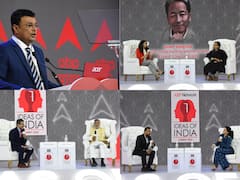Minimal State & Ram Rajya: Amish Tripathi Sheds Light On Ramayana's Lessons For Leadership At Ideas Of India
Ideas of India 3.0: Speaking on religion, politics, and governance, Amish Tripathi shared insights on creating an ideal leader based on the teachings of Ramayana.

The third edition of ABP Network's 'Ideas of India Summit' is currently underway, with a timely focus on the aftermath of Ayodhya's Ram Mandir consecration. Discussing 'Is Ram Rajya the Ideal State?' Renowned author, TV documentary host, and former diplomat Amish Tripathi on Friday said that Ramayana itself does not explicitly discuss the concept of 'Ram Rajya' but offers interpretations of what it should embody.
The name 'Ram' holds significance in matters of faith, religion, and politics, playing a substantial role in India's political landscape Speaking on religion, politics, and governance, Amish shared insights on creating an ideal leader based on the teachings of Ramayana.
Ramayana Doesn't Talk About Ram Rajya: Amish Tripathi
During the discussion, Tripathi invited the audience to share their understanding of 'Ram Rajya' and highlighted that the concept is not explicitly detailed in the Ramayana but is found in philosophical texts like Yogvashisht.
When asked what does "Ram Rajya" mean to the author of the 'Rama Series'? "If someone isn't familiar with the concept and hasn't read about it in mythology books, how do you think they would interpret it?"
Addressing the audience, Tripathi, while responding to the question, questioned how many had read various versions of Ramayana, and whether 'Ram Rajya' had been described in any of them. He noted that 'Ram Rajya' is not found in the original Ramayana but is discussed in other texts, specifically mentioning Yogvashisht as a philosophical source.
Tripathi illustrated the essence of the Ramayana, stating, "Ramayana tells us what creates the kind of leader who can build a Ram Rajya". He drew a contrast between Lord Ram's noble reaction to personal suffering and Ravana's vengeful response.
"The Ramayana reveals the qualities needed in a leader capable of establishing a Ram Rajya—a person facing personal suffering yet reacting positively. While Ravana's response to personal pain was a vow to burn the world if hurt, Lord Ram, despite being hurt by the world, chose to respond with nobility. Despite the world causing him pain, Lord Ram aimed to give back positively, even if the world hadn't treated him kindly," Amish said.
Further recalling the grandeur of the January 22 event, Amish said: "I was present in Ayodhya on Jan 22. My wife and I created a documentary about the Rama Mandir event, covering the temple's story from its beginnings, starting with the birth of Lord Rama."
Quoting KK Mohammed, a historian, whom Amish interviewed for his documentary, he said that " Ram Mandir janambhoomi issue at hand is not about Hindu-Muslim differences but rather an Indian-foreigner matter." Amish further highlighted that Babar hailed from Uzbekistan, and while we refer to them as "Mughals", they identified themselves as 'Timurids' from Central Asia.
Watch The Ideas Of India 2.0 Live:
An Amalgamation Of Traditional & Modern World: How Amish Developed Interest In Mythology
The session's host, Chetan Bhagat, asked Tripathi when he (Amish) first became interested in mythology.
'Writing a book requires a great deal of involvement in something, and you (Amish) wrote book after book on Indian mythology. Was it always an interest?" Chetan asked.
"It always was. I grew up in a religious and traditional family. My grandfather is a priest, able to perform the pran prathishtan puja, and a professor at BHU. They valued academic achievement over social standing. I went to Convent School. So we had both worlds: traditional at home and modern at school and college," Amish responded.
Keep The State Minimal: Amish On How Tradition Guides Governance
On the topic of governance and how our traditions guide governance, Tripathi distinguished between the "Chanakyan State" and the "Ashokan State." He advocated for a minimalistic approach, citing Chanakya's belief that too much state interference leads to chaos. Tripathi expressed a preference for a Chanakyan state, focusing on key areas such as law and order, infrastructure, and trade regulation.
The "Chankanyan state" was small but highly effective. It was not a libertarian state; it would do a few things, enforce its will in a few areas, and leave the rest to society. Why? Because Chanakya believed that if the state interfered in too many things, there would be chaos," Amish said.
He further added: "The first Indian state to promote vegetarianism was Ashokan state. In the Ashokan system, the state was involved in a variety of activities. I believe that we should follow the Chanakyian state in certain areas such as law and order, infrastructure, and trade regulation; this would avoid moralising. It exhibited vigilantism. The Chanakiyan state would even allow but regulate prostitution."
"We don't have a Chanakyan state; we have an Ashokan state, which interferes in too many things, causing distractions and preventing the system from performing its core functions. In my opinion, the Chanakya state is better. You do a few things, and enforce it better. Chanakya once said that 'trying to control' corruption in bureaucrats is similar to trying to control how much water a fish drinks. There is no control," Amish said.
Tripathi concluded by quoting from Ramcharitmanas, suggesting that the governance of Lord Ram involved minimal taxation. He urged for a minimal state, leaving decisions about personal choices to the people and society.
Amish said: "There is a superstition prevention act in Maharashtra; if I had to do it, I would do it in the traditional way. Going from village to village, talking to each other. When the state intervenes in too many areas, it becomes weak. It should be up to individuals and society to decide what they want to eat, marry, and believe in."
"This is exactly how the philosophical books interpret, Ram Rajya. Maintain a minimal state. One of the Ramcharitmanas' observations about Lord Ram's governance is that the state should not levy excessive taxes. "The state should tax like a bee collecting nectar from a flower," he added further.
How Traditions And Reforms Are Balanced In Society? Amish Explains:
Responding to questions about traditional values, Tripathi affirmed that traditions with lasting value are those that have proven to be effective experiments. He also highlighted the need to question and discard harmful traditions, citing his open opposition to the caste system.
When asked if something old (traditional) has more value? Is it good even if it is old? How is it possible to have a traditional society that also allows for reforms? The Amish responded to the question by saying, "Traditions that last are experiments that worked."
"If a tradition serves a purpose, it still has value today. But there are some traditions that must be questioned. Like the 'Caste System'. I openly question the caste system. I speak out against it. I don't use my surname on my books. I question it politely," he said.
In reference to transgender people and acceptance in traditional society, Amish quoted Lord Rama: "Purush napunsak nari va jiv charachar koi, sarva bhaav bhaja kapat taji mohi param priya soi" (man, queer, woman, even plants and animals, free of meanness and full of devotion, are all equally dear to me).
Watch streaming of Ideas of India on Metaverse: https://events.abpverse.com/
The Ideas Of India Summit 3.0:
ABP Network's flagship event, the 'Ideas Of India Summit,' brings together prominent figures to explore the similarities and differences that define India, the world's largest democracy. Scheduled just before the Lok Sabha elections in 2024, the third edition on February 23 and 24 aims to set 'The People's Agenda'.
Building on the success of the previous two editions with themes 'Naya India' and 'Open-Minds Open Minds,' the third edition is expected to continue uncovering the ideas and concepts shaping India.
Related Video
Breaking: Jaishankar to Visit Netherlands, Denmark, and Germany After Operation Sindoor





































